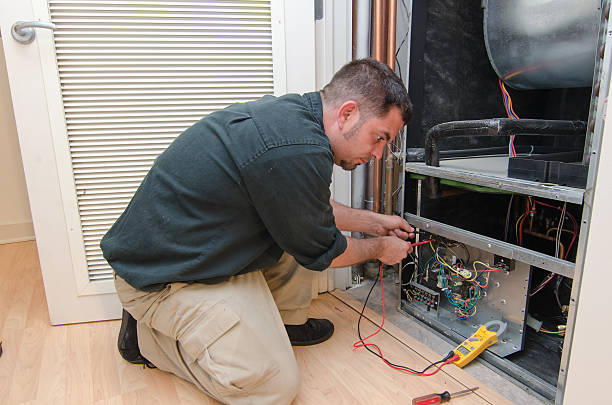Heat Pump Repair in Safety Harbor, FL

A malfunctioning heat pump in Safety Harbor, FL, disrupts home comfort. Our expert technicians provide professional heat pump repair, quickly diagnosing and fixing issues like poor heating/cooling, strange noises, or leaks. We follow a comprehensive process, including thorough diagnosis, clear explanations, and quality repairs using approved parts. We also guide homeowners in deciding between repairing their unit or considering a replacement, evaluating factors like system age, repair cost, and energy efficiency for the best long-term comfort solution.

Expert Heat Pump Repair in Safety Harbor, FL
In Safety Harbor, where the climate demands reliable year-round temperature control, a malfunctioning heat pump is more than an inconvenience—it's a disruption to your comfort and daily life. Whether you're facing the sweltering humidity of summer or an unexpected winter chill, your heat pump is the heart of your home's comfort system. When it fails, you need a fast, effective solution from local experts who understand the unique challenges of Florida's weather. Our dedicated technicians specialize in diagnosing and repairing heat pump systems throughout the Safety Harbor area, ensuring your home returns to a comfortable state as quickly as possible. We are equipped to handle any issue, from minor glitches to complete system failures, with a commitment to quality workmanship and lasting solutions.
Common Heat Pump Problems We Diagnose and Fix
A heat pump is a complex piece of machinery, and various issues can compromise its performance. Our experienced technicians are trained to identify the root cause of any problem, ensuring a precise and effective repair. We frequently address the following issues for homeowners in Safety Harbor:
Unit Fails to Heat or Cool Effectively One of the most common complaints is a heat pump that isn't producing appropriately hot or cold air. This can manifest as weak airflow, air that is lukewarm, or a system that runs constantly without changing the indoor temperature. The cause could range from a simple thermostat miscalibration or a clogged air filter to more serious problems like low refrigerant levels, a failing reversing valve, or a compromised compressor.
Strange or Loud Noises During Operation Your heat pump should operate with a consistent, low hum. Any sudden or unusual noises are a clear sign that something is wrong.
- Grinding or Squealing: These sounds often point to failing motor bearings or a problem with the blower fan. Immediate attention is needed to prevent the motor from burning out.
- Banging or Clanking: A loud banging noise could indicate a loose part, such as a fan blade hitting the casing, or a more severe issue with the compressor.
- Hissing or Gurgling: This typically signals a refrigerant leak, which is a serious issue that reduces efficiency and can damage the compressor over time.
System Leaks Water or Refrigerant Any visible leak from your heat pump requires professional attention. In Florida's humid environment, a clogged condensate drain line can cause water to back up and spill, potentially leading to water damage and mold growth. A refrigerant leak is even more critical; it not only hampers your system's ability to heat and cool but also poses an environmental and safety risk. Our technicians can locate the source of the leak and perform the necessary repairs safely.
Short-Cycling If your heat pump turns on and off in rapid succession, it is "short-cycling." This is highly inefficient and places immense strain on the system's components, leading to premature failure. Common causes include a dirty air filter restricting airflow, an improperly sized unit for your home, low refrigerant levels, or a faulty thermostat.
Unexpected Spike in Energy Bills A sudden and unexplained increase in your electricity bill is often an early warning sign that your heat pump is struggling. When a component begins to fail or the system loses efficiency, it must work harder and run longer to maintain the desired temperature, consuming significantly more energy.
Our Comprehensive Heat Pump Repair Process
We believe in a transparent and thorough approach to every repair. When our technicians arrive at your Safety Harbor home, they follow a systematic process designed to deliver a reliable and lasting fix.
- Thorough System Diagnosis: We begin with a comprehensive inspection of your entire heat pump system. This includes checking the indoor air handler and the outdoor unit, testing electrical connections, measuring refrigerant pressure, inspecting the compressor and motors, and evaluating thermostat performance. This detailed diagnostic phase allows us to pinpoint the exact cause of the problem, not just treat the symptoms.
- Clear Explanation and Recommendations: Once the issue is identified, our technician will explain the findings to you in clear, easy-to-understand terms. We will outline the necessary repairs, discuss the parts and labor involved, and provide a full picture of the solution before any work begins.
- Professional Repair with Quality Parts: Our team uses high-quality, manufacturer-approved parts to ensure every repair is durable and reliable. Whether it’s replacing a capacitor, repairing a refrigerant leak, or installing a new fan motor, we perform the work with precision and care, adhering to the highest industry standards.
- System Testing and Verification: After the repair is complete, we don’t just pack up and leave. We thoroughly test the system to ensure it is operating correctly in both heating and cooling modes. We verify that airflow is strong, temperatures are accurate, and the unit is cycling properly, confirming that your home comfort has been fully restored.
Deciding Between Heat Pump Repair and Replacement
A common question homeowners face is whether to invest in a repair or consider a full system replacement. Our goal is to provide you with the information you need to make the best financial decision for your home. We'll help you evaluate several key factors:
- Age of the System: The average lifespan of a heat pump in Florida's demanding climate is typically 10 to 15 years. If your unit is approaching or has surpassed this age, replacement often becomes a more cost-effective long-term solution.
- Cost of the Repair: A widely used guideline is the "50% rule." If the cost of a single repair is close to half the cost of a new system, investing in a new, more efficient unit is generally the smarter choice.
- Frequency of Breakdowns: If you find yourself scheduling repairs multiple times a year, the cumulative costs can quickly add up. Constant breakdowns are a strong indicator that the system is failing and a replacement is imminent.
- Energy Efficiency: Older heat pumps have much lower efficiency ratings (SEER and HSPF) than modern units. A new high-efficiency system can significantly reduce your monthly energy bills, with the savings helping to offset the initial investment over time.










